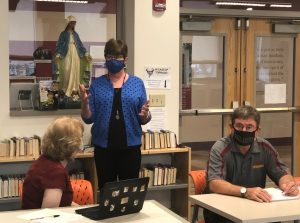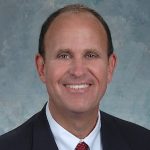Scecina pushes for academic success during a pandemic

Education coach Marty Moore of Tools for Success works with Scecinamath teacher Elizabeth Williams (left) and English teacher Tony Schmoll.
Note: This story highlights how Scecina implemented a hybrid system of in-person and online classes as school started again in August. In November Archdiocese of Indianapolis schools in Marion County, including Scecina, returned to online-only learning at the recommendation of the county public health department. In-person classes are set to resume Jan. 19, 2021.
By Beth Murphy, Director of Marketing Communications
Scecina continues to make the safety and academic success of its students and its teachers a top priority during the COVID-19 pandemic.

Interim Principal David Dellacca
Scecina is using all the professional educational tools and processes available to make the school year positive and successful, while remaining rooted in faith, said Interim Principal David Dellacca.
“More than anything, this is our faith in action,” he said. “This is a time we rely on God in ways we didn’t know we needed him before. If nothing else, it’s given people time and opportunity to realize where their strength comes from.”
Back to school
After a long break that started unexpectedly in March 2020, Scecina reopened its doors to students on August 10, 2020. Students are divided among four cohorts and attend classes in person or online every day on a “hybrid” schedule of Red and Gold Days. At the end of the first grading period, 41 percent of Scecina’s students had made the honor roll.
Scecina’s keys to success are:
- Ongoing professional development for teachers
- Synchronous learning through which teachers at the same time are teaching to two groups of students: those physically in the classroom and those participating online from home
- A switch to block scheduling of academic classes in which classes meet for longer periods of time and every other day
- Hiring of an online learning advisor to help students learning at home
Ongoing Professional Development
The school already had been working with consultants from Tools for Success, a Central Indiana company that focuses on “the art of learning with the tool of teaching.”
The focus had been on “curriculum mapping,” the process of connecting the curriculum to state standards. The pandemic was an opportunity to continue the partnership with Tools for Success while transitioning to synchronous learning and block scheduling.
“The academic departments have been meeting in small groups and working really well together to develop department-wide strategies,” he said. “Their meetings with Tools for Success are in small groups with teachers from other departments. It’s really good to have that dedicated time and hear from outside experts on best practices for teaching.”
Marty Moore, a Tools for Success education coach, works with Scecina teachers. She has had an “incredible experience of working alongside Scecina staff this past year.”
“Their ‘can-do’ attitude as they’ve moved from face-to-face to virtual to hybrid exemplifies the mission of Scecina to motivate lifelong learners. Every day in the building I see them pouring into students and walking the way of servant leadership,” she said.
Synchronous learning
Scecina was able to use technology to accommodate the hybrid schedule in the classroom. Teachers can teach to the students physically in the classroom while also teaching the students who are learning at home twice a week on the hybrid schedule or every day or learning at home.
Block Scheduling

Scecina President Joe Therber
For 2020-21, Scecina implemented a block schedule of longer class periods. The decision came after much study and discussion among teachers and administrators and support shown by parents during summer input sessions.
Block scheduling benefits include a slower pace for teachers and students while allowing them to get to know one another better; more in-depth learning; absent students miss only four classes in one day; and stress levels often decrease.
“We already were studying block scheduling and probably would have made the switch,” said Scecina President Joe Therber. “The pandemic just moved the process along more quickly.”
Students continue to have eight academic classes, but no longer all in one day. They now have four 80-minute classes one day and four 80-minute classes on the other.
“Classes really benefit from having a longer time with students, in a lot of the arts, and in science, such as more time for labs and experiments, and in our media production class, for example,” Mr. Dellacca said.
Online Learning Advisor
Some students are facing significant barriers to success during the pandemic. Some have been in mandatory quarantine or live in a home where members are medically compromised. Others are international students living in China or Brazil.
Scecina’s new online learning advisor, Ben Potts, helps by:
- Monitoring and supporting online students’ daily attendance and academic achievement
- Solving problems with students, families, and teachers regarding online students’ academic engagement and progress
- Serving as part of the Student Support Team to ensure that online learners’ perspectives are considers in decision-making
- Assisting in academic, social-emotional, and behavioral interventions for online students.
Students and teaching staff have shown appreciation for the online advisor:
- A senior: “Thank you! Your check-ups on me are greatly appreciated.” – a senior
- A veteran teacher: “Thanks for your dedication to these kids! As I get swamped right now, I am breathing easier knowing you are there to help as well. It really is a grace-filled gift to all us teachers.”
- An international student: “Thanks very much. I don’t have words that can thank you all.”
A parent’s perspective
Cheryl Hentz, a parishioner at St. Michael Catholic Church in Greenfield, has two sons at Scecina. Anthony is dealing with a senior year that’s uncertain, and Matthew is starting his Scecina journey with new eyes as a freshman.
“Mentally, emotionally, spiritually, the kids needed to be here. The spring (with the sudden closure) was hard,” she said.
She has been impressed with how Scecina has adapted with the block schedules and proper safety procedures. Her sons are having a good year, better than her friends’ children in other schools, she said.
“I think Scecina took a real measured approach to starting the school year, and I think that was what helped, and the teachers have been fabulous,” she said. “This was very well planned out. I appreciate that Scecina took its time and didn’t make rash decisions. I think that’s why the fall has gone so well.
She and her husband, Joe, attended each parent session over the summer and felt informed about the steps Scecina was contemplating and what path the school eventually took.
A teacher’s perspective
Kathryn Wetzel, chair of Scecina’s English Department, is teaching for her sixth year at Scecina. She teaches all freshman English classes and is the moderator of the Book Club and the new Creative Writing Club.
“Trying to give kids in the room and at home the same amount of attention has been a real challenge, as has keeping the students engaged and focused while at home,” she said.
Ms. Wetzel focuses on the “silver linings.” Mastering new technologies, while challenging, has given her extra skills for the future. Trying to give attention to each student helps her make every encounter count and focus on what is most important to teach.
“If you dwell on the negative, that’s all you see; if you choose to search for the silver linings and moments of gratitude, then you have a much better outlook and mental health,” she said.
